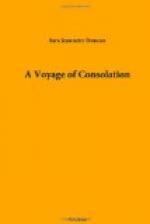This statement of the Senator’s struck me as something to be acted upon. If there was to be a constant possibility of his going off with any chance American in regular communication with the United States, our European tour would be a good deal less interesting than I had been led to expect. While momma was getting ready for the Louvre, therefore, I stepped down to the office and wired our itinerary to his partner in Chicago. “Keep up daily communication by wire in detail,” I telegraphed, “forward copies all important letters care Peters.” Peters was the tourist agent who had undertaken to bless our comings and goings. I said nothing whatever to poppa, but I felt a glow of conscious triumph when I thought of Mr. Malt.
We stood and realised Paris on the pavement while the fiacre turned in from the road and drew up for us. I had every intention of being fascinated and so had momma. We had both heard often and often that good Americans when they die go to Paris, and that prepares one for a good deal in this life. We were so anxious to be pleased that we fastened with one accord upon the florist’s shop under the hotel and said that it was uniquely charming, though we both knew places in Broadway that it couldn’t be compared with. We looked amiably at the passers-by, and did our best to detect in the manner of their faces that esprit that makes the dialogue of French novels so stimulating. What I usually thought I saw when they looked at us was a leisurely indifferentism ornamented with the suspicion of a sneer, and based upon a certain fundamental acquisitiveness and ability to make a valuation that acknowledged the desirability of our presence on business grounds, if not on personal ones. It seemed to be a preconcerted public intention to make as much noise in a given space as possible—we spoke of the cheerfulness of it, stopping our ears. The cracking of the drivers’ whips alone made a feu de joie that never ceased, and listening to it we knew that we ought to feel happy and elated. The driver of our fiacre was fat and rubicund, he wore a green coat, brass buttons, and a shiny top hat, and looked as if he drank constantly. His jollity was perfunctory, I know, and covered a grasping nature, but it was very well imitated, like everything in Paris. As he whirled us, with a whip-report like a pistol-shot, into the train of traffic in the middle of the street, we felt that we were indeed in the city of appearances; and I put down in my mind, not having my note-book, that Paris lives up to its photographs.
“We mustn’t forget our serious object, dear,” said momma, as we rolled over the cobblestones—“our literary object. What shall we note this morning? The broad streets, the elegant shops—do look at that one! Darling, is it absolutely necessary to go to the Louvre this morning? There are some things we really need.”
Momma addressed the Senator. I mentioned to her once that her way of doing it was almost English in its demonstrativeness, and my other parent told me privately he wished I hadn’t—it aggravated it so.




